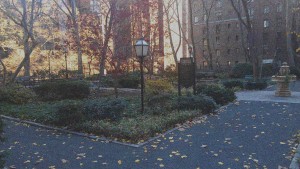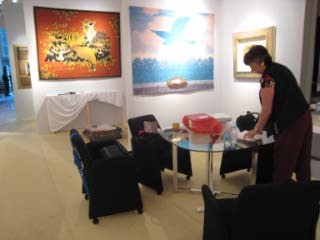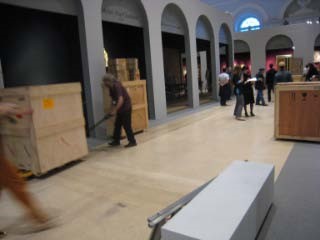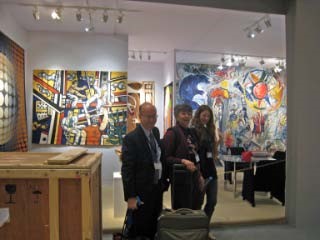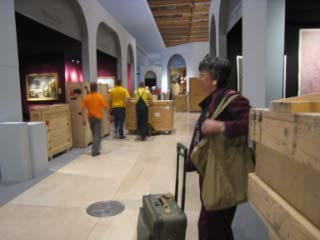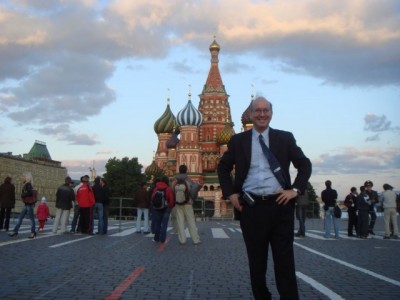Mathes Missive from Moscow #14 – Monday: The Last Day, The Last Missive

Greetings for the final time from Moscow,
Today, Monday, is the last day of the Moscow World Fine Art Fair. Fairs tend to end with whimpers rather than build to crescendos. While it’s possible that multiple oligarchs will descend upon the booth in the last five minutes with sacks of rubles on their shoulders, the majority of dealers at most fairs sell nothing. The odds of selling in Russia are supposed to be even longer. Numerous old-timers have told us nothing will happen until the Russians begin to know and trust us — which will take years. These same people have also marveled at a foreigner who came to Moscow a few years ago and miraculously left with one of the richest men in Russia as her devoted client. (What they don’t know is that the oligarch discovered that the woman was in fact his long-lost cousin — so much for miracles.)
In any event, I would like to tell you that we are optimists at heart — but I cannot, since this information would be confidential. 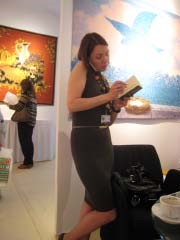
But the omens do not bode well. The first thing I see when I look out my hotel window this morning are three unloved, unwanted stray dogs sleeping in the construction site across the street. Lucky I’m not Herman Melville; any symbolic comparison to Jane, Julia and me is strictly coincidental. I hope. It is also about to rain, which doesn’t thrill me — I have turned in my borrowed umbrella to the Sheraton. Even the breakfast buffet has lost its allure. How much fish does a person really want to eat at 8:00 o’clock? And instead of fresh squeezed orange juice this morning, I get canned. Definitely not a good sign if you’re superstitious (luckily I’m not, knock on wood).
Surprisingly, it is a busy day at the fair. Last days are often sparsely attended, but here the crowds still pack the aisles. Crowds, however, mean nothing. There is probably only one real buyer for every thousand browsers at events like these. Most folks view art fairs the way they do museums, sporting events, and zoos: as entertainment. I suppose things equal out, since we have to view the people who wander through as prey. We are fishermen. But catching a bunch of small fry will not begin to pay our expenses. Like every dealer here, we have brought only our best and most expensive items as bait. We are fishing for whales. All we need to catch is one.
The day proceeds as days at any art fair do. Secretly. At five o’clock wry, beautiful Oxana (have I mentioned how beautiful Russian women are?) drops by the booth to inquire if we have made arrangements for the move-out. We told her what William told us last night, that nothing would happen until Tuesday. “Sorry,” says Oxana cheerfully (chaos makes her cheerful), “not true.”
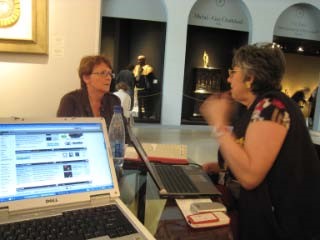 Determined to figure out what’s going on, Jane tracks down sober, stern-looking Francoise (Swiss, you know), whom everyone says is in charge of the move-out (William, Oxana, and Francoise all belong to different groups identified by different letter arrangements: SOC, ACS, CIA, AT&T). Francoise has yet a third version of tonight’s events — totally different than either of the other’s (except the bit about the chaos).
Determined to figure out what’s going on, Jane tracks down sober, stern-looking Francoise (Swiss, you know), whom everyone says is in charge of the move-out (William, Oxana, and Francoise all belong to different groups identified by different letter arrangements: SOC, ACS, CIA, AT&T). Francoise has yet a third version of tonight’s events — totally different than either of the other’s (except the bit about the chaos).
At nine o’clock the guards usher the stragglers and last-minute hagglers out of the Manege. The house lights go on. Crates start appearing in the aisles. The fair is over.
How did we do? Unfortunately, you know I cannot tell you — even if we knew ourselves at this point (whether we do or not I can’t say, either). But you are welcome to assume the best, or the worst, depending upon your philosophical orientation in life.
As we pack up the materials that we carried into Russia and will carry out in our hand luggage, we finally understand that 1) we don’t have any choice but to trust the wonderful (and expensive) French art handlers (who are actually Swiss) to pack up our booth; 2) customs will come tonight, but they don’t need for us to be present to verify that everything that came out of the crates will go back into the crates — checking paperwork is their passion; 3) SERIOUS guards are everywhere throughout the building so nothing will disappear; 4) every crate will be weighed after it is packed and all discrepancies will be investigated; 5) we are paying a fortune for insurance and are covered if anything does happen to go wrong. So why do we want to stick around all night?
There really is only one sensible thing for us to do.
Marat and our magic carpet are waiting outside the Manege. It is quarter to eleven when we arrive at Cafe Babai; our favorite neighborhood Uzbek restaurant is open until midnight. The three of us share a last meal together (don’t miss the Wedding Plov, is my advice to you) and compare notes. At quarter to one we are still comparing, but the gracious Uzbeks apparently never even consider throwing us out — everyone we have encountered in this city is hospitable and gracious.
Jane has a full-blown cold, a sore throat (hey, I never had a sore throat — maybe what she has isn’t mine), and a slight fever, which she plans to enjoy over the following week. Tomorrow she will sleep late, then come back to Manege and check to see what happened last night. Was our booth properly disassembled? Did everything make it intact into the crates? Will we have problems with customs? Jane wants to believe everything will have been done perfectly (if it isn’t, look out below). On Wednesday she will fly to Switzerland — Art Basel, one of the most important art fairs in the world, is opening this week. Jane never misses it — not to exhibit, God forbid, but just to keep up on what’s going on. (Some would say that she is a tireless, dedicated, passionate art professional to run off to Basel after just spending two weeks working her tail off in Moscow; others would say there is perhaps just the teeniest bit of lunacy involved.)
Julia has decided not to go to Greece after all. The paper she was to deliver on Gypsy dance was due on May 31st. Julia had been staying up all night working on it at her friend’s unheated apartment at the beginning of the week, after frog-marching us through Moscow every day through the rain. This is why she got sick, she claims again, it wasn’t from me at all. With the paper unfinished and the trip to Greece unnecessary, Julia can now spend two weeks doing what she says will certainly cure her — swim in the Black Sea. It may be that she actually intends to swim ACROSS the Black Sea. If anyone can do this, it would be Julia. She must return to her friend’s cold apartment again tonight — there are no rooms available at the hotel. When I realize she doesn’t have any warm clothes, I lend her my sweater — I won’t need it, I’m going back to New York tomorrow.
Julia is still puzzling what she will do with the rest of her life. Over the past few days she has made several comments about how she believes she could be very effective in the art business, and that maybe she might have a gallery of her own one day. A lot easier said than done, but if someone can swim the Black Sea, maybe she could also make a success in the art business. The tasks are probably on a par.
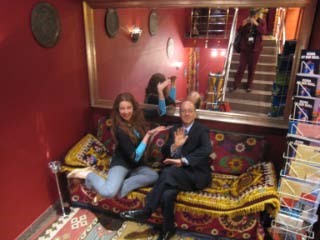
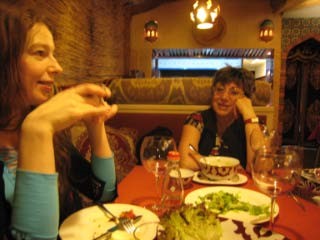
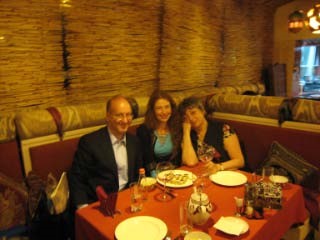
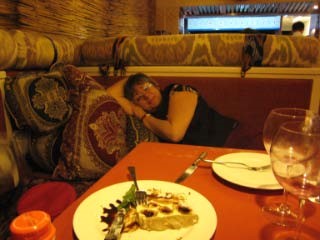 As for myself, tomorrow Marat will pick me up at the Sheraton Palace at 8:00 a.m. and drive me to the airport. He has to charge 500 rubles more than he charged Terry because the traffic as he returns to the center city will take hours to negotiate on a weekday morning.
As for myself, tomorrow Marat will pick me up at the Sheraton Palace at 8:00 a.m. and drive me to the airport. He has to charge 500 rubles more than he charged Terry because the traffic as he returns to the center city will take hours to negotiate on a weekday morning.
“Stalin built roads, Brezhnev built roads,” he will tell me (with hands and “mouths”) during the drive. “Roads are what the people need – there is only this one road to the airport and it must bear all the traffic. Is it any wonder it’s so crowded? But Medvedev and Putin, all they build are more and more big buildings downtown, because that is where the money is . How’s your cough ?”
“Better, thanks. I gave it to Jane (‘Mouth’).”
“May God watch over you and give you a safe flight home,” says Marat at the airport as he helps me wheel my two suitcases to the curb. Actually he just points at the miniature reproductions of icons on his dashboard (the Armenian equivalent of fuzzy dice?), then holds his hand to his heart, then points to me. “You will call me when you come back, and I will be here to drive you again, yes?”
“Absolutely! ” I assure him (“Absolutely!”). We share a manly hug and pound one another on the back.
In the Moscow Times on Monday I will read about how bands of skinheads have been assaulting Jews and Armenians and anybody who isn’t an ethnic Russian. I know there is a dark side to Russia, and I am glad that I did not see it. I saw only happy, brilliant, playful, funny, likeable, gracious people. There is a dark side of America, too. I don’t want to see it, either.
On the nine and a half hour flight back to New York as I will write this last missive, I will look back over my time in Russia with Jane and Julia, with Terri, with Marat, with John from Bloomberg and marvel at my good fortune. It has indeed been a trip of a lifetime for us all.
I suppose I should be tired after two weeks of working from morning to night, eating too much too late, straining each minute of each day to do everything I can to maximize our chances of making a sale. To a gallery sales are survival. There has been not just a lot at stake here, there has been everything. But I’m not tired. In fact I’m invigorated and looking forward to the future, as in their own ways are all the characters in this little play, I’m sure.
My thoughts keep coming back to something Julia said a few days ago.
“The best rest is the change of activity.”
Julia had been quoting Lenin. Somehow that’s both fitting and accurate, I think. I do feel rested. And changed. And happy that I’ve been able to bring you along.
Do svidaniya! from Moscow. See you in New York.
P.S. By my count (and I’m counting this back in New York after after about 15 hours in transit, so I might be mistaken) there have been 15 Missives from Moscow (counting #6 1/2). If you didn’t receive one, please let me know and I’ll resend. When I wake up.
